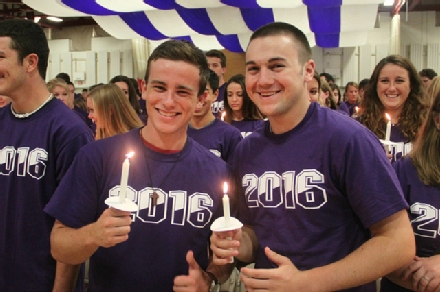Cura Personalis
A Community of Service
No edition of our annual strategic plan progress report would be complete without recognition of the commitment to service that is central to our mission as Catholic, Jesuit university. For some, the progress of a strategic plan is marked by the new projects and challenges met. At the University, supporting, sustaining, and growing service opportunities for all members of our community has been, and will remain, a strategic commitment. In 2012-13, 1,995 students completed over 26,000 service learning hours through the Panuska College of Professional Studies. Over 2,800 students - nearly half of the University's total enrollment - took part in 170,000 hours of service activities to local agencies during the past year. And, eighty-two staff took part in the University's Mission and Community Service Leave program, contributing over 1,385 hours of service to various organizations, locally and across the world. Our alumni remain engaged, too; this past April, over 400 students and alumni participated in the Alumni Day of Service, volunteering their time at twelve service sites in ten cities across the country. Additional indicators and outcomes related to service are listed below.

Centers for Engagement
The University’s Jesuit Center completed its inaugural year in 2012-13. As described by Fr. Kevin Quinn, president of the University, the Center will play a central role in the life of the University community, serving as a resource to “engage faculty and staff in our mission and will help to keep our Catholic and Jesuit identity at the core of our work together,” further expanding the Jesuit-lay partnerships that are essential to the continuity of Jesuit higher education. The Center will directly further one of the goals of our strategic plan, which seeks to provide faculty and staff, especially those that are new to our community, with opportunities to help them understand and appreciate the sacred and centuries old work of Catholic and Jesuit education. In its first year, the Center sponsored several new seminar, retreat, and service opportunities for faculty and staff, including a seminar on "Teaching as Vocation in the Jesuit Tradition," which engaged University faculty in examining the Catholic and Jesuit tradition, and encouraged them to explore ways to foster that mission in their work as professors. Two international service trips - the El Salvador Pilgrimage and the Kino Border Initiative Trip to the Nogales border of Arizona and Mexico - brought University faculty and staff to experience the work of Jesuits in service to those who are at the margins of our society.
The Panuska College of Professional Studies' Leahy Community Health and Family Center has been become a part of the University that serves not only those in need within the city of Scranton and surrounding communities, but an venue for direct, interdisciplinary experience for PCPS students to learn and to serve. PCPS faculty actively engage in guiding students in practical educational experiences. The Center works with several local agencies, forming a true community partnership to advance health care. Academic programs use the center for experiential education for students, including pre-med majors at the University, and medical students at the local Commonwealth Medical College. The Center plays a direct role in the new TAPESTRY program in the Panuska College. In 2012, the Center welcomed 1,717 patient visits, and 901 patients through June 2013. Students performed 2,175 hours of service in the Center in 2012, and an additional 1,195 through June 2013. According to a survey conducted this past year by the Center, overall patient satisfaction is over 90 percent.
The University's Small Business Development Center (SBDC) continues to help fuel the regional economy. In 2012, the Center helped to develop 40 new local businesses, and secured over $6 million in funding for small business clients. The SBDC teamed up with the University's Office of Community Relations, the Greater Scranton Chamber, the City of Scranton and Lackawanna County Commissioners, and Scranton Tomorrow to launch the Small Business Internship Initiative. This program, designed to attract area college students with small businesses, is being piloted with three downtown Scranton businesses this year, and plans to expand the program to the SBDC's eight-county service area are already underway. Launched last year, the University's Women's Entrepreneurship Center - a partnership with the University's Kania School of Management (KSOM) and the SBDC - has been a resounding success. In 2013, seven University students completed internships through the Center, and over 440 hours of small business assistance was provided to 47 clients. Donna Simpson, SBDC Consultant Manger, and KSOM professor Dr. Alan Brumagim traveled with two KSOM students to Rwanda to facilitate a week-long entrepreneurship training series for 60 students of the Akilah Institute for Women.

Selected Strategic Indicators
- 113 members of the University community participated in International Service Program (ISP) trips in 2012-13; 91 of these were students, up from 76 in the prior year.
- 82 members of the University staff took part in the University's Mission and Service leave program.
- Seven (7) University students were named Scholars in Service by AmeriCorps.
- In fall 2012, 1,029 students in the Panuska College of Professional Studies completed over 13,000 hours in service learning. In spring 2013, 926 students completed an additional 13,000 hours of service.
- 117 academic courses at the University incorporate a service learning component. 35 of these are in the Panuska College.
- Students at the University once again completed over 170,000 hours of community service during the 2012-13 academic year.
- 20 incoming ninth-grade students completed the University of Success summer institute, the initial event for incoming members of the University of Success pre-college mentorship program. This year, AT&T announced a $30,000 grant to help fund this program.






